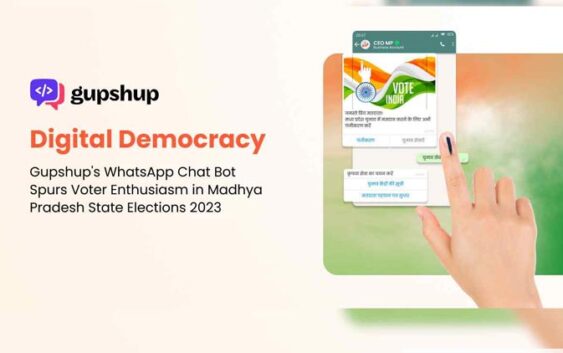Madhya Pradesh State Election office witnesses tremendous success in citizen engagement during state elections 2023 with Gupshup’s WhatsApp chatbot

Bhopal, February 22, 2024 — Forget social media. During the recently concluded state elections in M.P, a WhatsApp chatbot exhibited a new model of citizen engagement by successfully engaging over 1.2 million citizens with the state election office. The chatbot built by Gupshup for the Madhya Pradesh Chief Electoral Officer’s (CEO) office effortlessly addressed a myriad of queries including voter list verification, polling location inquiries, and clarification on acceptable identification documents such as Aadhar Cards.
One of the notable achievements of the chatbot was its role in facilitating voter registration procedures. Over 2 lakh individuals seeking corrections in their voter IDs or submitting new registration forms were seamlessly directed to the appropriate portal links. This not only streamlined the registration process but also instilled trust among citizens, as the guidance came directly from the official WhatsApp handle of CEO-MP.
With a staggering 55 million eligible voters in the state, the Madhya Pradesh State Election Office recognized the imperative of establishing a dynamic, two-way conversational channel. The chatbot served as an effective means to engage with the tech-savvy youth demographic, providing a platform for feedback collection, swift resolution of election-related queries, encouragement of voter registration, and dissemination of crucial updates – all on a scale previously unattainable.
The election office further used the WhatsApp Business API for real-time communication with polling officers on election day. They could efficiently deliver timely alerts to 65,000 deployed polling officers, ensuring vital information dissemination and intelligence gathering at specific time intervals. Prompt responses from polling officers via WhatsApp on the day of the polls helped quickly calculate voting percentage in different parts of the state which could then be shared with media outlets and the Election Commission of India for reporting.
“The introduction of the WhatsApp chatbot has transformed the landscape of citizen engagement in electoral processes. By providing instant, reliable information to citizens across the state, we have witnessed a significant improvement in voter participation and trust in the electoral system”, said Anupam Rajan, Chief Electoral Officer, Madhya Pradesh.
Elections in India are a massive exercise in voter engagement and the success of the WhatsApp chatbot underscores its pivotal role in enhancing transparency, accessibility, and efficiency in the electoral process. By harnessing cutting-edge technology and leveraging the ubiquitous reach of WhatsApp, the Madhya Pradesh State Election Office has ushered in a new era of citizen-centric governance and democratic participation.
“We are delighted to have partnered with the Madhya Pradesh State Election Office in implementing this wonderful initiative. The success of the WhatsApp chatbot underscores the power of conversational AI in fostering meaningful engagement between citizens and government institutions. We look forward to continuing our efforts to drive innovation and facilitate democratic participation across India”, said Vikas Goel, Senior Director, Government vertical at Gupshup.
Going ahead, the state election office plans to establish the chatbot as an always-on channel for continuous citizen interaction with the Election Commission. Additionally, the team will leverage the service to prompt citizens for requests such as deletion of deceased voter IDs during the annual update window.


